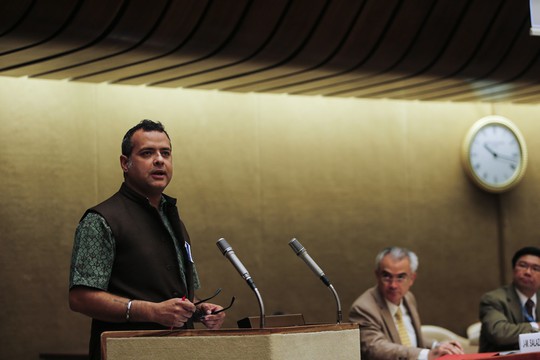Vijay Prashad (photo), a the Director of Tricontinental Institute for Social Research, and co-author to famous philosopher Noam Chomsky, presented his Statement made at the United Nations Economic and Social Council Chamber on October 30, 2023. He sharply criticizes the illegal sanctions that the United States uses for its political purposes. Main points:
“My institute, Tricontinental, has spent the past eight years closely studying the impact of unilateral sanctions, looking closely at the laws around these instruments and looking at their impact on the societies that have been sanctioned.
There is no easy way to define sanctions. When a conflict arises between countries, any measure short of war belongs in the category of sanctions. Sanctions could be diplomatic (withdrawal of ambassadors) or economic (barriers on trade). Even though sanctions are not like bombs, their impact can be as lethal as has been demonstrated by the several reports by UN Special Rapporteur on the Negative Impact of Unilateral Coercive Measures on the Enjoyment of Human Rights, Professor Alena Douhan (for example, in her reports on Iran, Syria, Venezuela, and Zimbabwe).
Several questions emerge even with this basic definition of sanctions:
1) Who gets to determine when a country poses a danger or deserves to be sanctioned?
2) How does one differentiate between extreme economic sanctions and armed conflict? Is not a complete embargo tantamount to a declaration of war?
In the modern world, these questions are to be adjudicated by the United Nations. The United Nations Charter (1945) is the legal document that binds countries in the UN General Assembly and in the UN Security Council (UNSC) to consider cases of conflict and find measures to settle disputes or to pressure countries to reconsider their course of action.
The central text in the UN Charter is Article 41.
The Security Council may decide what measures not involving the use of armed force are to be employed to give effect to its decisions, and it may call upon the Members of the United Nations to apply such measures. These may include complete or partial interruption of economic relations and of rail, sea, air, postal, telegraphic, radio, and other means of communication, and the severance of diplomatic relations.
The United States has – outside the UN system – exercised a sanctions policy in a unilateral manner. These US sanctions are not conducted through a discussion in the UNSC, nor have they any international credibility. In fact, US sanctions are illegal. They are a violation of the UN Charter and of a range of international treaties.
The impact of these sanctions is grotesque, and it has been documented by the United Nations and by the various human rights groups. Not only does the United States refuse to allow its nationals (including corporations) to conduct normal commercial activity with the country it decides to sanction, but it uses its power over the financial system to get other countries and firms from other countries to halt their trade relations. These are called secondary and tertiary sanctions, and they have the impact of a total blockade on countries by those who only act in this way out of fear or coercion by the United States. Overcompliance of the unilateral coercive measures becomes the rule, not the exception, as Special Rapporteur Dohan shows in her report to the 54th session of the UN Human Rights Council.
What is important to bear in mind is that the unilateral sanctions have undermined the ability of the sanctioned countries to meet their important obligations to the Sustainable Development Growth (SDG) agenda. We have seen a retreat in terms of meeting the SDG goals: only one-third of countries in the world would have halved their national poverty rates between 2015 and 2030 and nearly one in three (2.3 billion people) will remain moderately or severely food insecure. These basic developments are squandered by $2.3 trillion expenditure on weapons, more than 75% of that spending done by the United States and its NATO allies.
Why has there been this retreat in the SDGs, however limited they are in scope and ambition? Because of a range of factors, but sharply because of the permanent debt crisis enforced by the International Monetary Fund and by the illegal sanctions regime enforced by the United States.”
read more in our Telegram-channel https://t.me/The_International_Affairs

 8:38 05.11.2023 •
8:38 05.11.2023 •























